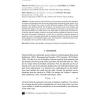Free Online Productivity Tools
i2Speak
i2Symbol
i2OCR
iTex2Img
iWeb2Print
iWeb2Shot
i2Type
iPdf2Split
iPdf2Merge
i2Bopomofo
i2Arabic
i2Style
i2Image
i2PDF
iLatex2Rtf
Sci2ools
JIRS
2006
2006
Exploratory Navigation Based on Dynamical Boundary Value Problems
The paper presents a general framework for concurrent navigation and exploration of unknown environments based on discrete potential fields that guide the robot motion. These potentials are obtained from a class of partial differential equation (PDE) problems called boundary value problems (BVP). The boundaries are generated from sensor readings and therefore they change as the robot moves. This framework corresponds to an extension of our previous work (Prestes et al., 2001; Prestes et al., 2002). Here, we propose that a careful choice of the PDE and the boundary conditions can produce efficient exploratory behaviors in sparse and dense environments. Furthermore, we show how to extend the exploratory behavior to produce new ones by changing dynamically the boundary function (the value of the potential at the boundaries ) as the exploration takes course. Our framework is validated through a series of experiments with a real robot in office environments.
Related Content
| Added | 13 Dec 2010 |
| Updated | 13 Dec 2010 |
| Type | Journal |
| Year | 2006 |
| Where | JIRS |
| Authors | Marcelo Trevisan, Marco Aurélio Pires Idiart, Edson Prestes e Silva Jr., Paulo Martins Engel |
Comments (0)

